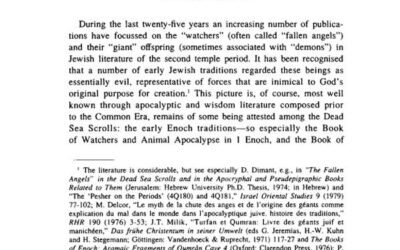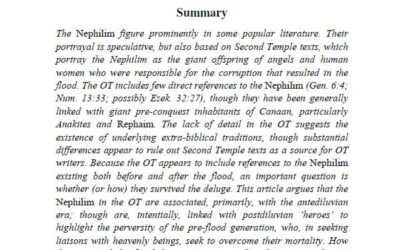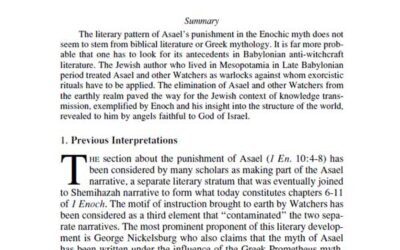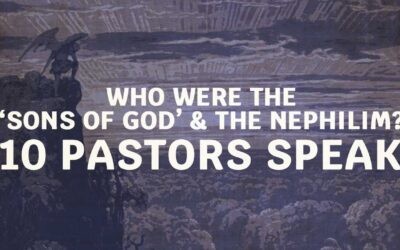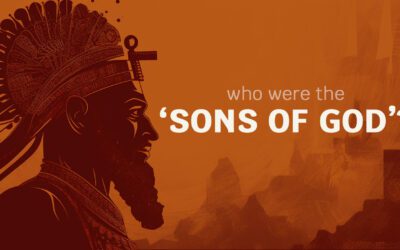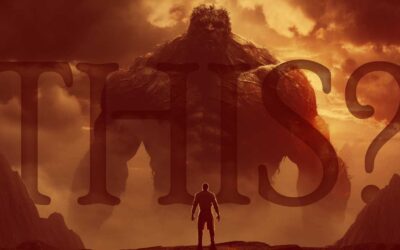Which came first, Genesis 6:1-4 or pagan myths?
Shedding light on his unique perspective on the passage, Lee Anderson Jr., (who earned his BA and MA in biblical studies from The Master’s College) authored an article titled “Is ‘Sons of God’ in Genesis 6 Adapted Pagan Mythology?”, published in 2015 in the Answers Research Journal.
Research Findings and Interpretations
Lee Anderson Jr. dives into the heart of the matter by presenting an array of perspectives regarding the identity of “the sons of God” in Genesis 6:1-4.
This portion of Scripture has sparked numerous interpretations, ranging from the idea that these “sons of God” were angelic beings to theories that they represented dynastic rulers or godly descendants of Seth.
Anderson meticulously examines these viewpoints, dissecting their strengths and potential weaknesses.
A significant aspect of Anderson’s analysis is his address of the critical scholarship that suggests the presence of adapted pagan mythology in the text. This notion claims that the biblical author might have incorporated external myths into the narrative, thereby undermining the uniqueness and integrity of Scripture.
Anderson takes a different route by asserting that the polemical elements evident in the Creation and Flood accounts are reemphasized in Genesis 6:1-4.
Instead of accommodating pagan mythology, the text counters it. Anderson’s exploration leads him to propose that the “sons of God,” who could be elevated to demigod-like status in ancient Near Eastern myths, are in fact portrayed as distinct from true divine entities.
By aligning this interpretation with the larger theological framework of the Old Testament, Anderson challenges the argument of borrowed myth and emphasizes that the passage serves as an antimyth—a bold assertion that casts the story as a deliberate opposition to pagan narratives.
“All the views evaluated in this paper (at least in the versions presented) are resistant to the notion of Genesis 6 being adapted myth.
Lee Anderson jr.
They make no room for Scripture’s alleged acquiescence to the prevailing pagan ideas of its day.”
Counterarguments and Implications
As with any academic discourse, counterarguments emerge.
Anderson acknowledges that some critics maintain that certain elements in Genesis 6:1-4 bear resemblance to existing pagan myths, raising the question of potential influence.
The biblical author, according to Anderson, does not merely adopt myths; rather, he crafts a narrative that directly challenges and opposes them.
A vital implication of Anderson’s interpretation is its apologetic function. The text, as he argues, reinforces the supremacy of the one true God, Yhwh, over all entities, even those mistakenly elevated in pagan myths.
This perspective renders the “sons of God” as neither divine nor mythological figures, but rather as entities fallen into wickedness. Such an understanding safeguards the uniqueness and authority of the biblical text.
Who were the ‘Sons of God’ in Genesis 6:1-4?
Lee Anderson Jr. credits the oldest of the three interpretations of the ‘sons of God’ – that the “sons of God” were fallen angels – with being the one he believes best fits the available evidence.
This interpretation has roots in ancient Jewish exegesis and has found support not only in early church fathers but also in more contemporary scholars.
As Anderson examines this viewpoint, he unveils the historical continuity of the fallen angels perspective and its enduring influence on both Christian and Jewish traditions.
“The oldest exegetical position on the identity of “the sons of God” is that they were fallen angels. This is the view assumed in the earliest Jewish exegesis, for example, in 1 Enoch 6:2. and in Jubilees 5:1.
Similarly, certain variants of the Septuagint, including Codex Alexandrinus, translate בְנֵי־הָאֱלֹהִים as ἄγγελοι τοῦ θεοῦ (“angels of God”). The Jewish historian Josephus (37–c. 100) also assumes this view in The Antiquities of the Jews, as does the Jewish philosopher Philo (c. 25 BC–c. AD 50) in De Gigantibus.
This interpretation likewise appears in the Dead Sea Scrolls, as well as in the writings of several notable early church fathers—including Justin Martyr (100–165), Clement of Alexandria (c. 150–c. 215), Athenagoras (c. 133–c. 190) , and Tertullian (c. 155–c. 240).
This position remained the dominant interpretation until the Sethite view was popularized by Augustine (see above).
More recently, the fallen angels view has the support of many prominent Christian and Jewish exegetes.”
Anderson, Lee. “Is the “Sons of God” Passage in Genesis 6 Adapted Pagan Mythology?.” Answers Research Journal vol. 8 (2015): 261–271. https://answersresearchjournal.org/sons-god-genesis-6-pagan-mythology/.
Critiques and Conclusions
In conclusion, Anderson’s work navigates the labyrinthine terrain of interpretations surrounding Genesis 6:1-4. His analysis brings to light a counterargument to the idea of borrowed pagan mythology, asserting that the text employs polemical elements to challenge and undermine such influences.
By portraying the “sons of God” as distinct from true divine beings and aligning this interpretation with the broader theological themes of the Old Testament, Anderson builds a robust case against the notion of adapted myth. This perspective, as he contends, upholds the integrity of Scripture and emphasizes its unwavering commitment to monotheism and the unique character of Yhwh.
While Anderson’s paper offers a comprehensive overview of interpretations, it could further enrich its discourse by delving deeper into the landscape of pagan myths that seemingly intersect with the Genesis narrative. Addressing the parallel stories found in Greek and Roman mythology could provide a broader contextual backdrop. Additionally, exploring the relationship between the Book of Enoch, the Book of the Giants, and other Second Temple literature could illuminate further connections and responses to pagan narratives.
In the evolving discourse on the enigmatic “sons of God” in Genesis 6:1-4, Lee Anderson Jr.’s contribution offers a thought-provoking perspective that invites scholars and readers alike to reconsider the presence of adapted pagan mythology in the biblical text.

